Indigenous
Who Are the Indigenous People of New Zealand?
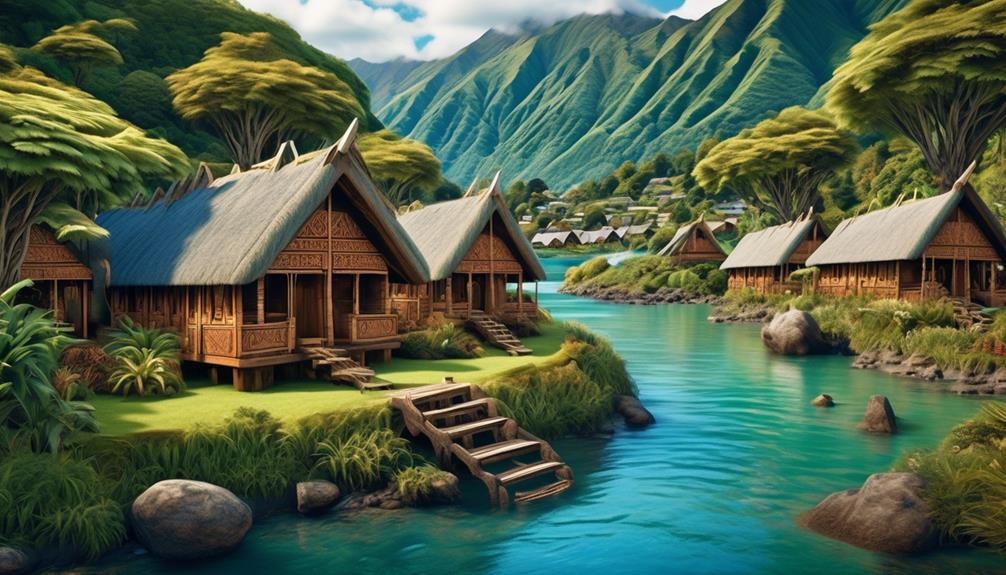
As we explore the diverse and vibrant history of New Zealand, we are inevitably captivated by the intricate and compelling narrative of the indigenous Māori people.
Their ancient lineage and deep-rooted connection to the land have woven a narrative that continues to shape the cultural landscape of Aotearoa.
But who are the Māori people, really? What are the traditions and beliefs that have sustained them through centuries of change and adaptation?
Join us as we uncover the layers of Māori identity and explore the profound impact they have had on New Zealand's past, present, and future.
Key Takeaways
- The Māori people can be traced back to Polynesian explorers and their migration to New Zealand occurred over a thousand years ago.
- Māori culture is rooted in reverence for ancestors and the natural world, with traditions such as the powerful war dance called Haka and communal meeting grounds called Marae.
- Māori spiritual beliefs and practices involve ceremonies that connect individuals with ancestral connections and the natural world, honoring ancestors through prayers, songs, and offerings.
- Māori people view themselves as stewards of the land, with a deep connection to nature and a commitment to environmental stewardship and guardianship.
The Origins of the Māori People
The origins of the Māori people can be traced back to the Polynesian explorers who ventured across the vast Pacific Ocean, eventually reaching and settling in the islands of Aotearoa, now known as New Zealand. This remarkable journey, known as the Māori migration, occurred over a thousand years ago, showcasing the incredible seafaring abilities and navigational prowess of the Polynesian ancestors.
The Māori people have a rich Polynesian ancestry, with their cultural practices, language, and traditions deeply rooted in the heritage of their forebears.
The Māori migration to New Zealand was a monumental event in their history, shaping their identity and laying the foundation for their unique and vibrant culture. The ancestral ties to Polynesia are cherished and upheld with great pride, as they form an integral part of the Māori worldview and historical narrative.
Understanding the Māori migration and their Polynesian ancestry provides a profound insight into the depth of their connection to the land, the sea, and their enduring legacy as the indigenous people of New Zealand.
Māori Culture and Traditions
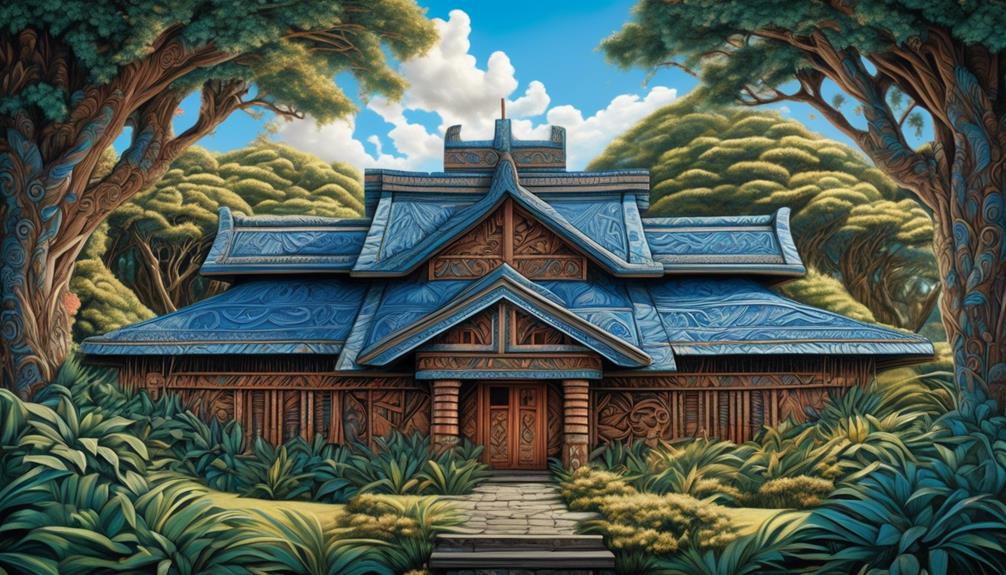
Rooted in a deep reverence for their ancestors and the natural world, Māori culture and traditions are a vibrant tapestry of customs and values that have endured through generations. One of the most iconic elements of Māori culture is the haka, a powerful and emotional ancestral war dance. The haka is a unique combination of chanting, vocal sounds, and rhythmic movements, expressing a wide range of emotions, from challenge and aggression to welcome and honor. It is a deeply spiritual and awe-inspiring performance that holds great significance in Māori culture.
In addition to the haka, Māori culture is also deeply connected to the concept of marae, which are communal meeting grounds. Marae etiquette and customs play a crucial role in Māori social structure and gatherings. When visiting a marae, it is essential to follow protocols such as removing shoes before entering the meeting house, respecting the elders, and observing proper speech and behavior. These customs uphold the values of respect, hospitality, and unity within the Māori community.
| Māori Haka Performance | Marae Etiquette and Customs |
|---|---|
| Powerful and emotional war dance | Crucial role in Māori social structure |
| Expresses a wide range of emotions | Upholds the values of respect and unity |
Māori Spiritual Beliefs and Practices
Deeply intertwined with the Māori way of life are their spiritual beliefs and practices, which serve as guiding principles for their community.
Spiritual ceremonies play a vital role in Māori culture, connecting individuals with their ancestral connections and the natural world. These ceremonies are rich in symbolism and tradition, often involving rhythmic chanting, intricate dances, and the sharing of stories that honor their ancestors. Through these rituals, the Māori people seek to maintain a deep connection with their past and the land they inhabit, fostering a profound sense of belonging and identity within the community.
The Māori people also place great importance on their ancestral connections, believing that their ancestors continue to play a significant role in their lives. They honor their ancestors through prayers, songs, and offerings, seeking their guidance and protection in various aspects of daily life. This spiritual reverence for their ancestors forms the foundation of Māori identity and fosters a deep sense of respect for their heritage.
In essence, Māori spiritual beliefs and practices are a testament to the enduring strength of their cultural traditions, binding past, present, and future generations in a profound spiritual tapestry.
Māori Land and Connection to Nature
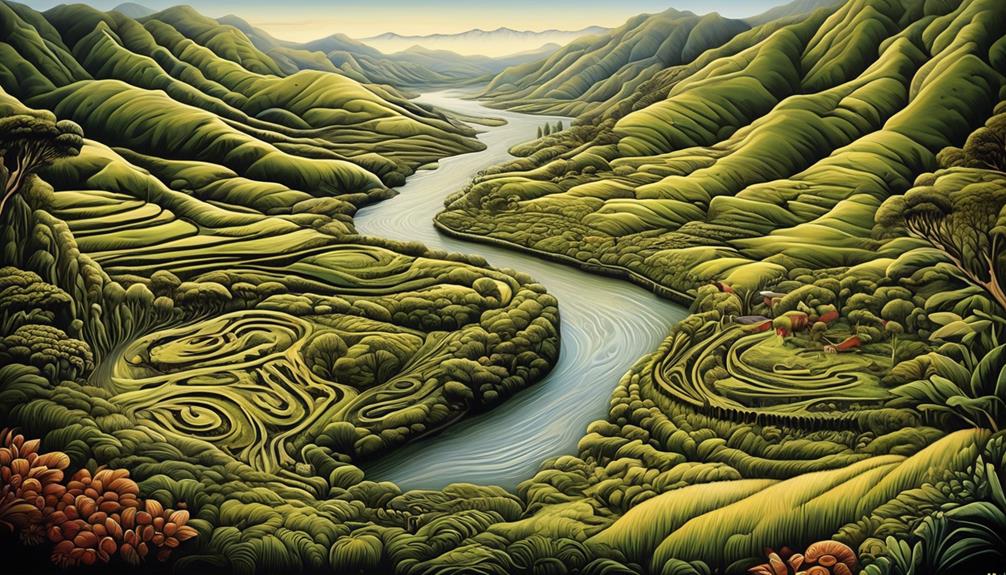
With a profound reverence for the land and a deep connection to nature, the Māori people embody a spiritual and cultural kinship with their environment. Land preservation is a fundamental aspect of Māori culture, rooted in the concept of 'kaitiakitanga' which encompasses environmental stewardship and guardianship. Māori view themselves as stewards of the land, responsible for its care and protection for future generations. This intrinsic connection to the natural world is deeply ingrained in our traditions, shaping our values and way of life.
The concept of 'whenua' holds great significance for the Māori people, representing not only the land but also the placenta, symbolizing the spiritual and physical connection between the people and the earth. This sacred relationship with the land is evident in the rituals and customs that underpin Māori life, from the welcoming of newborns to the burial rites of the deceased.
Māori land isn't seen as a commodity but as a taonga (treasure) to be respected and safeguarded. The Māori worldview emphasizes harmony and balance with nature, offering valuable insights into sustainable living and environmental conservation. This enduring connection to the land serves as a poignant reminder of the essential role indigenous cultures play in promoting ecological awareness and respect for the natural world.
The Contemporary Presence of the Māori
Preserving our cultural and spiritual connection to the land, the contemporary presence of the Māori is characterized by a resilient commitment to maintaining our traditions in a rapidly changing world. This commitment is evident through our active pursuit of Māori language revitalization, ensuring that our unique linguistic heritage remains a vibrant and integral part of our identity.
Māori Language Revitalization: Embracing our language as a cornerstone of our cultural identity, we're actively involved in initiatives aimed at revitalizing and preserving the Māori language for future generations.
Māori Political Representation: We're dedicated to achieving meaningful representation in political institutions, working towards ensuring that Māori perspectives and interests are effectively represented and considered in decision-making processes.
Cultural Preservation: Our contemporary presence is marked by a steadfast commitment to preserving and celebrating our rich cultural traditions, fostering a sense of pride and identity within the Māori community.
Frequently Asked Questions
What Are the Traditional Foods and Cooking Methods of the MāOri People?
Traditional cuisine of the Māori people revolves around fresh, locally sourced ingredients like seafood, kumara, and fern root. Cooking techniques include hangi (earth oven), where food is slow-cooked underground using heated rocks, and steaming in a traditional earth oven. These methods infuse the food with a unique smoky flavor.
The Māori people have a deep connection to their land and these traditional foods and cooking methods are integral to their cultural identity.
How Do MāOri Communities Govern Themselves and Make Decisions?
In Māori communities, community governance and decision-making processes are deeply rooted in collective consensus and respect for traditional knowledge. Our people prioritize inclusive dialogue and seek to honor our ancestral wisdom when addressing important matters.
Through communal gatherings and shared discussions, we work together to reach decisions that benefit our entire community. This approach reflects our commitment to upholding our cultural values and fostering unity within our communities.
What Are Some Common Misconceptions About the MāOri People?
Misconceptions about the Māori people often stem from stereotypes that overlook their rich cultural practices and societal contributions.
It's important to recognize that Māori culture is diverse and dynamic, not monolithic. Many misconceptions arise from a lack of understanding and appreciation of their traditions.
How Has Colonization Affected the Language and Education of the MāOri People?
Colonial impact on the Māori people has had significant consequences. This includes language revitalization efforts and addressing educational disparities.
The effects of colonization have led to challenges in preserving Māori language and culture. However, ongoing initiatives aim to address these issues. The revitalization of the Māori language is seen as crucial in preserving the cultural identity of the Māori people.
Another consequence of colonial impact is the educational disparities faced by the Māori community. These disparities have been a concern for many years, with Māori students often experiencing lower educational outcomes compared to their non-Māori counterparts.
Efforts are being made to ensure equitable access to education for Māori communities. This includes initiatives that focus on culturally responsive teaching practices and curriculum development that reflects the Māori worldview and values.
It is crucial to recognize and support the cultural preservation of the Māori people. This involves acknowledging the impact of colonization and actively working towards redressing its effects. By supporting language revitalization efforts and addressing educational disparities, we can help ensure the preservation and flourishing of Māori language, culture, and identity.
What Are Some Important MāOri Art Forms and Their Significance in the Culture?
Ta moko, a traditional form of tattooing, holds immense cultural significance for the Māori people. It represents genealogy and personal stories, symbolizing our identity and connection to the land.
Wharenui, or meeting houses, are crucial for community gatherings and preserving traditions. They display intricate carvings that honor our ancestors and are integral to our traditions.
Both ta moko and wharenui are vital art forms that foster a strong sense of community and pride among the Māori people.
Conclusion
In conclusion, the Māori people of New Zealand are a vibrant and resilient indigenous community with a rich cultural heritage. Their deep connection to the land and spiritual beliefs have shaped their traditions and way of life.
As we've explored their origins, culture, and contemporary presence, it's clear that the Māori people are like a strong, ancient tree, firmly rooted in their history and flourishing in the present day.
Let's continue to honor and learn from their wisdom and traditions.
Mary is a passionate writer who brings creativity and a fresh perspective to our team. Her words have the power to captivate and inspire, making her an essential contributor to our content. Mary’s commitment to storytelling and dedication to promoting Indigenous culture ensures that her work touches the hearts of our readers. We’re fortunate to have her as part of our team.
Indigenous
How to Make a Difference for Missing and Murdered Indigenous Women
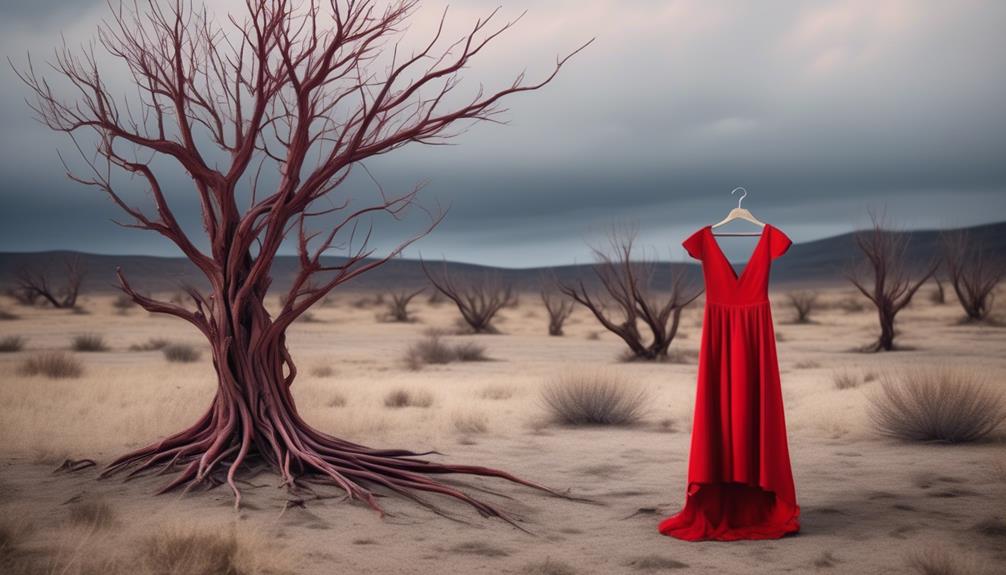
Analyzing the extensive data and heartbreaking stories surrounding missing and murdered Indigenous women, it is clear that urgent action is required.
However, simply acknowledging the problem is not enough. There are tangible steps we can take to make a difference, from understanding the root causes of this crisis to actively supporting Indigenous-led initiatives.
But how exactly can we contribute to meaningful change? Let's explore some practical ways we can address this pressing issue and truly make an impact.
Key Takeaways
- Acknowledge the historical and systemic factors contributing to the crisis of missing and murdered Indigenous women.
- Raise awareness about the realities facing Indigenous women through community events and educational initiatives.
- Advocate for policy reforms that prioritize the safety and well-being of Indigenous women and girls.
- Support Indigenous-led initiatives by engaging with local communities, fostering partnerships, and integrating cultural traditions and knowledge.
Understanding the Issue
Understanding the issue of missing and murdered Indigenous women requires acknowledging the historical and systemic factors that have contributed to this ongoing crisis. From an Indigenous perspective, the roots of this crisis run deep, intertwined with a legacy of colonization, marginalization, and systemic injustice. For centuries, Indigenous women have faced disproportionately high rates of violence, often at the hands of non-Indigenous individuals, and their cases have been met with indifference from law enforcement and the justice system.
Systemic injustice has perpetuated this crisis, with failures in reporting, investigating, and prosecuting cases of missing and murdered Indigenous women. This has led to a pervasive sense of mistrust and fear within Indigenous communities, further exacerbating the issue.
It's crucial to recognize that addressing this crisis requires a comprehensive understanding of the complex historical and contemporary factors at play.
Raising Awareness
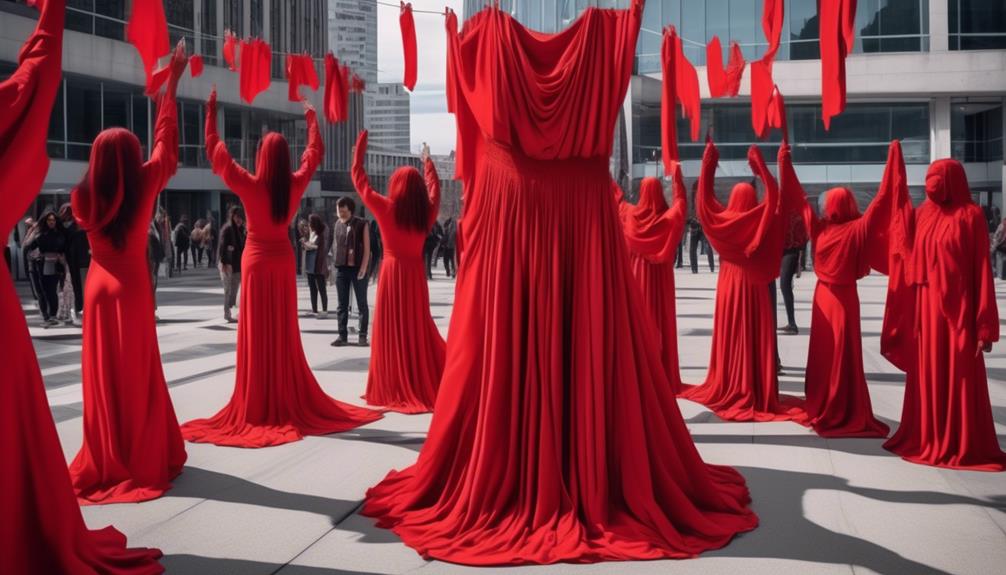
Raising awareness about the crisis of missing and murdered Indigenous women is crucial in mobilizing support and action to address this urgent issue. To achieve this, we must engage our communities and educate them about the realities facing Indigenous women.
Here are some key strategies for raising awareness:
- Community Engagement
- Organize community events, such as panel discussions or workshops, to bring people together to learn and discuss the issue.
- Collaborate with local Indigenous organizations and leaders to ensure that the awareness efforts are culturally relevant and respectful.
- Education and Allyship
- Implement educational initiatives in schools and workplaces to foster a deeper understanding of the challenges Indigenous women face.
- Encourage individuals to become allies by promoting cultural sensitivity and advocating for the rights and safety of Indigenous women.
Advocating for Policy Changes
To make a lasting impact in addressing the crisis of missing and murdered Indigenous women, we must now focus our efforts on advocating for policy changes that will bring about tangible and meaningful solutions.
Policy reform is crucial in addressing the systemic issues that contribute to the high rates of violence against Indigenous women. Through legislative advocacy, we can push for the implementation of policies that prioritize the safety and well-being of Indigenous women and girls.
Advocating for policy changes involves engaging with lawmakers and decision-makers to push for reforms that address the root causes of violence against Indigenous women. This can include advocating for increased funding for law enforcement agencies to improve their response to missing persons cases involving Indigenous women, as well as pushing for the implementation of culturally sensitive support services for Indigenous communities.
Additionally, advocating for policy changes also entails working towards the incorporation of Indigenous perspectives and traditional knowledge into the development of laws and policies that directly impact Indigenous women.
Supporting Indigenous-Led Initiatives
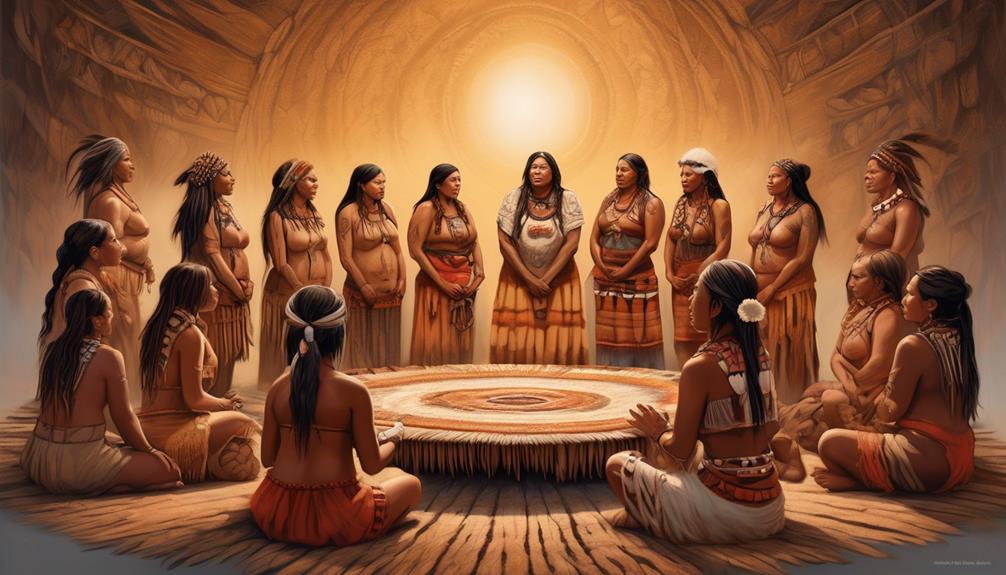
We are committed to actively supporting Indigenous-led initiatives aimed at addressing the unique challenges faced by Indigenous women and girls. It's crucial that we prioritize community involvement and cultural sensitivity in our approach to supporting these initiatives.
- Community Involvement
- Engage with local Indigenous communities to understand their specific needs and priorities.
- Foster meaningful partnerships with grassroots organizations and community leaders to ensure that initiatives are truly reflective of the community's desires and aspirations.
- Cultural Sensitivity
- Integrate cultural traditions, practices, and knowledge into the design and implementation of initiatives, respecting the diversity and richness of Indigenous cultures.
- Provide opportunities for Indigenous women and girls to lead and shape the initiatives, honoring their voices and lived experiences.
Taking Direct Action
Let's roll up our sleeves and start taking direct action to address the systemic issues contributing to the disappearances and murders of Indigenous women and girls. Community organizing and grassroots activism are powerful tools that can bring about significant change.
By organizing within our communities, we can advocate for policy reforms, raise awareness, and provide support to those affected. One way to take direct action is to organize community forums or events where Indigenous women and their families can share their experiences and voice their concerns. These gatherings can serve as a platform for community members to come together, offer support, and strategize for change.
Grassroots activism involves mobilizing individuals at the local level to collectively work towards a common goal. This can include organizing marches, creating educational materials, and engaging in outreach efforts to raise awareness about the plight of missing and murdered Indigenous women.
Frequently Asked Questions
What Are Some Common Barriers That Prevent Indigenous Communities From Accessing Justice for Missing and Murdered Indigenous Women?
Barriers preventing indigenous communities from accessing justice for missing and murdered indigenous women include:
- Lack of cultural sensitivity in the justice system
- Inadequate community support
- Insufficient advocacy
These challenges can hinder the reporting of cases and the pursuit of justice.
Our efforts must address these barriers by:
- Promoting cultural awareness
- Providing robust community support
- Advocating for systemic change
This is necessary to ensure that indigenous women receive the justice and support they deserve.
How Can Individuals Support Indigenous-Led Initiatives in a Culturally Respectful and Meaningful Way?
We can support indigenous-led initiatives in a culturally respectful and meaningful way by building supportive partnerships and enhancing cultural competency.
This involves actively listening to indigenous communities, respecting their leadership, and learning about their cultural traditions and values.
What Are Some Effective Ways to Take Direct Action in Addressing the Issue of Missing and Murdered Indigenous Women?
When addressing the issue of missing and murdered indigenous women, direct action is crucial.
Engaging in community empowerment initiatives and supporting indigenous-led organizations are effective ways to make a difference.
By amplifying indigenous voices and advocating for systemic change, we can work towards justice.
As the saying goes, 'actions speak louder than words,' so let's take direct action and stand in solidarity with indigenous communities to address this critical issue.
How Can Non-Indigenous Individuals Advocate for Policy Changes That Support and Protect Indigenous Women and Girls?
We can advocate for policy changes that support and protect indigenous women and girls by:
- Engaging with local and national government representatives
- Joining or supporting organizations that focus on indigenous rights
- Participating in advocacy campaigns
Community engagement is crucial for raising awareness and mobilizing support for policy changes.
What Are Some Important Cultural Considerations to Keep in Mind When Raising Awareness About Missing and Murdered Indigenous Women Within Non-Indigenous Communities?
When it comes to raising awareness about missing and murdered indigenous women within non-indigenous communities, cultural sensitivity is paramount.
It's pivotal to understand and respect the cultural nuances and traditions of indigenous communities.
Engaging with the community in a respectful and inclusive manner is crucial for effective advocacy.
Conclusion
In conclusion, it's crucial that we all come together to address the crisis of missing and murdered indigenous women.
By raising awareness, advocating for policy changes, and supporting indigenous-led initiatives, we can make a real difference.
Let's not just talk the talk, but also walk the walk and stand up for those who've been marginalized and forgotten.
It's time to put our money where our mouth is and take meaningful action to bring about change.
Mary is a passionate writer who brings creativity and a fresh perspective to our team. Her words have the power to captivate and inspire, making her an essential contributor to our content. Mary’s commitment to storytelling and dedication to promoting Indigenous culture ensures that her work touches the hearts of our readers. We’re fortunate to have her as part of our team.
Indigenous
Which of the Following Are Well Known Indigenous Writers?
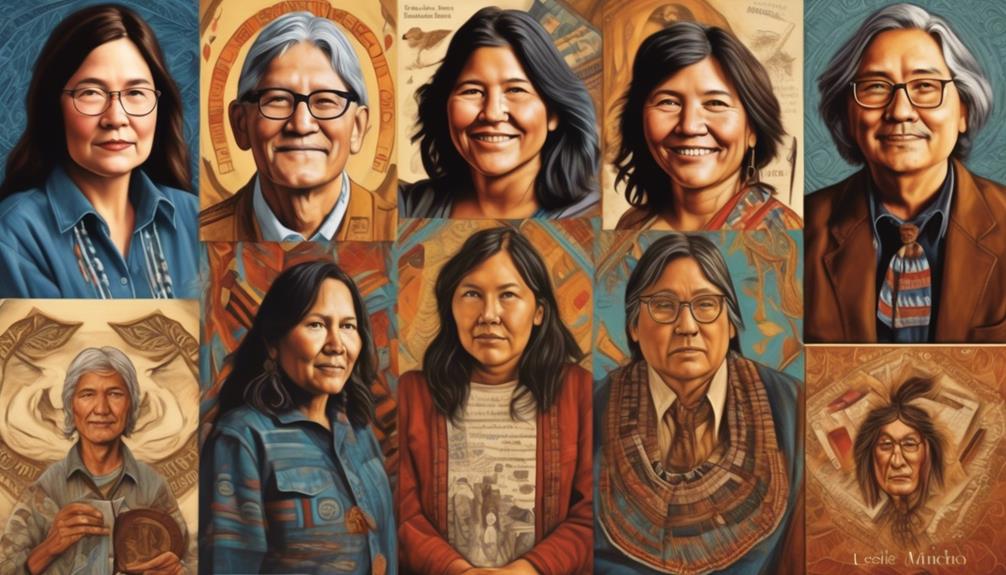
Who are some well-known American authors who have greatly influenced the world of literature? When we think about the realm of written works, names like Sherman Alexie, Louise Erdrich, Leslie Marmon Silko, Thomas King, and Oodgeroo Noonuccal often stand out.
However, are these the only indigenous writers we should be familiar with? Let's explore and uncover the rich tapestry of indigenous writers and their impactful contributions to the literary world.
Key Takeaways
- Sherman Alexie, Louise Erdrich, Leslie Marmon Silko, Thomas King are well-known indigenous writers.
- These writers explore contemporary indigenous experiences, shedding light on the impact of colonization on indigenous communities and challenging stereotypical portrayals of indigenous people.
- They skillfully weave storytelling tradition into modern narratives and incorporate indigenous storytelling traditions into contemporary literature.
- Oodgeroo Noonuccal is a significant figure in Indigenous literature, pioneering the inclusion of Aboriginal issues in Australian literature and advocating for social and political change.
Sherman Alexie
Sherman Alexie, a prolific and influential Native American writer, has garnered widespread acclaim for his poignant and unapologetic exploration of contemporary indigenous experiences. His works delve deeply into the complexities of cultural identity and the impact of colonization on indigenous communities. Through his writings, Alexie adeptly portrays the struggles and triumphs of Native Americans, offering a vivid portrayal of the challenges they face in a rapidly evolving world.
Alexie's contribution to indigenous literature is profound, as he skillfully weaves the storytelling tradition of his people into modern narratives, bridging the gap between the past and the present. His work serves as a powerful testament to the resilience and enduring spirit of indigenous cultures, while also shedding light on the harsh realities they confront in the wake of historical injustices.
Louise Erdrich
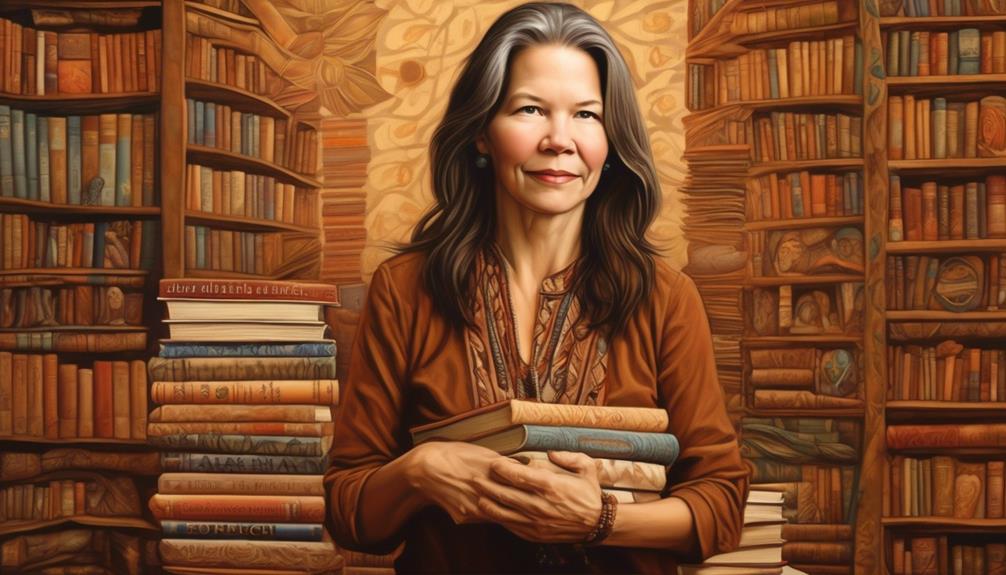
Louise Erdrich, an accomplished and celebrated indigenous author, has established herself as a prominent voice in contemporary Native American literature through her deeply evocative storytelling and insightful exploration of the complexities of indigenous experiences. Erdrich, a member of the Turtle Mountain Band of Chippewa Indians, has contributed significantly to the exploration of Ojibwe culture in her works, showcasing a deep commitment to cultural preservation and the portrayal of Native American resilience.
Erdrich's novels, such as 'Love Medicine' and 'The Round House,' delve into multigenerational storytelling, weaving together narratives that span across time to illuminate the depth and richness of indigenous heritage. Her writing exemplifies the power of Indigenous storytelling in conveying the intricate tapestry of Native American life, connecting past, present, and future in a way that resonates with readers on a profound level.
Through her poignant and masterful prose, Erdrich sheds light on the enduring spirit of Native American communities, offering a window into their experiences, struggles, and triumphs. Her contributions to Native American literature are invaluable, as she continues to enrich the literary landscape with her insightful and compelling portrayals of indigenous life.
Leslie Marmon Silko
Leslie Marmon Silko, another influential Indigenous author, similarly illuminates the complexities of Native American experiences through her evocative storytelling and profound exploration of cultural heritage. Silko's writing style is characterized by its rich oral tradition, blending traditional storytelling with contemporary narrative techniques. Her works, such as 'Ceremony' and 'Almanac of the Dead,' delve into the spiritual and cultural foundations of Indigenous communities, addressing themes of identity, tradition, and the impact of colonization on Native peoples.
Silko's profound exploration of cultural heritage is evident in her meticulous portrayal of traditional Laguna Pueblo beliefs and practices, infusing her narratives with the essence of Indigenous spirituality and interconnectedness with the land. Through her writing, Silko not only preserves the legacy of her people but also challenges mainstream literary norms, offering a unique perspective that intertwines history, myth, and personal experience.
Her works not only serve as a literary expression but also as a means of cultural preservation, capturing the essence of Indigenous traditions and worldviews. Silko's writings continue to be instrumental in broadening the understanding of Indigenous experiences and challenging the conventional literary canon.
Thomas King
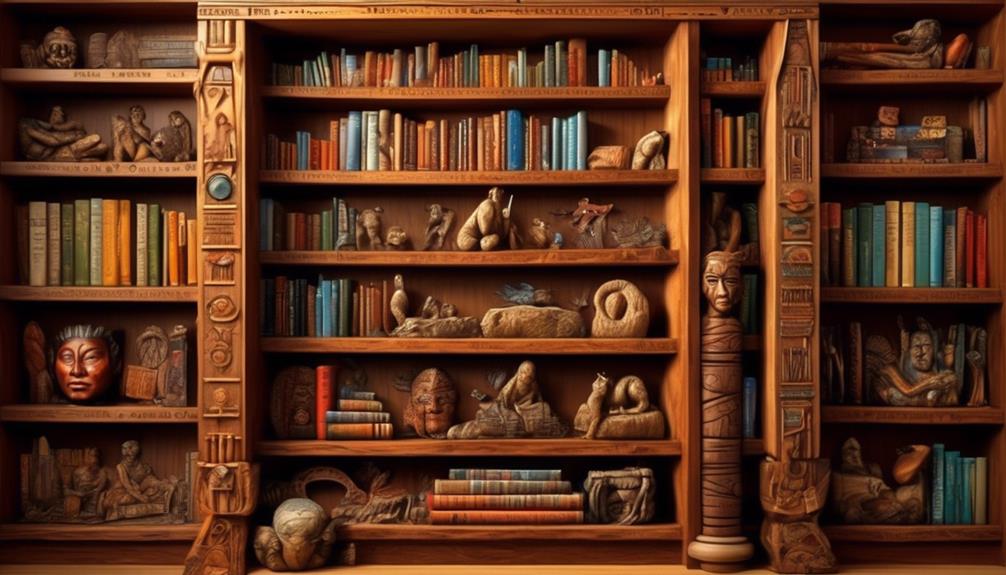
Renowned for his incisive wit and astute observations, Thomas King, a distinguished Indigenous writer, is celebrated for his thought-provoking narratives that skillfully navigate the complexities of Indigenous identity and history. King's works delve into the intricate layers of cultural identity, intertwining storytelling traditions with a deep exploration of Indigenous resistance in literature. His writing often showcases Indigenous humor as a powerful tool for addressing colonialism and environmentalism.
King's exploration of cultural identity is a central theme in his writings. He adeptly examines the nuances of Indigenous identity, challenging stereotypical portrayals and presenting a more authentic representation through his characters and narratives. His works navigate the impact of historical and contemporary forces on Indigenous communities, offering a profound understanding of the complexities of Indigenous experiences.
Moreover, King's incorporation of Indigenous storytelling traditions into his works serves to preserve and honor Indigenous oral traditions, weaving them into the fabric of contemporary literature. His narratives reflect a deep respect for the power of storytelling in Indigenous cultures, emphasizing its role in preserving history and fostering resilience in the face of adversity.
In addressing Indigenous resistance in literature, King confronts the legacies of colonialism, advocating for Indigenous voices to be heard and respected. Furthermore, his works often carry strong environmentalist messages, drawing attention to the interconnectedness of Indigenous communities with the natural world and the impact of environmental degradation on their lives.
Oodgeroo Noonuccal
A significant figure in Indigenous literature, Oodgeroo Noonuccal adeptly weaves together her experiences and cultural heritage to create impactful narratives that resonate with readers. Exploring Oodgeroo Noonuccal's impact on Indigenous literature reveals her pioneering role in bringing Aboriginal issues to the forefront of Australian literature. Her works, including 'We Are Going' and 'Stradbroke Dreamtime,' challenge the dominant narratives and stereotypes about Indigenous people, offering a counter-narrative that portrays the richness and complexity of Aboriginal life and culture.
Analyzing the themes in Oodgeroo Noonuccal's writings uncovers her deep commitment to social justice, the environment, and the preservation of Indigenous traditions. Her poetry often addresses the themes of dispossession, discrimination, and the importance of connection to the land. Noonuccal's writing also celebrates the resilience and strength of Indigenous communities, emphasizing the need for reconciliation and understanding between Indigenous and non-Indigenous Australians.
Oodgeroo Noonuccal's impact extends beyond her literary contributions; she was also a prominent activist for Aboriginal rights, using her platform as a writer to advocate for social and political change. Through her writing and activism, Noonuccal left an indelible mark on Indigenous literature, paving the way for future generations of Indigenous writers to share their stories and perspectives.
Frequently Asked Questions
What Specific Themes or Topics Do These Indigenous Writers Often Address in Their Work?
In their work, indigenous writers often explore themes related to cultural identity, delving into the complexities and nuances of their heritage.
Additionally, they frequently address the representation of historical trauma, shedding light on the impact of colonization and historical injustices on indigenous communities.
Through their writing, these authors provide a profound and insightful perspective on these themes, contributing to a deeper understanding of indigenous experiences and history.
How Have These Writers Influenced the Portrayal of Indigenous People in Literature and Popular Culture?
Indigenous writers have had a profound influence on the portrayal of indigenous people in literature and popular culture. Their work has had a significant cultural impact, challenging stereotypes and providing authentic representations of indigenous communities.
Through their storytelling, they've reshaped the narrative around indigenous experiences, shedding light on important issues and promoting understanding and empathy. Their influence has been instrumental in shaping a more accurate and respectful portrayal of indigenous peoples in various forms of media.
What Awards or Recognition Have These Writers Received for Their Work?
When it comes to literary accomplishments and cultural impact, these writers have received numerous awards and recognition for their work. Their contributions have been acknowledged through prestigious literary prizes, such as the Pulitzer, National Book Award, and the Nobel Prize in Literature.
Their work hasn't only garnered critical acclaim but has also significantly influenced the portrayal of indigenous people in literature and popular culture, leaving a lasting legacy for future generations.
Are There Any Common Writing Styles or Techniques That These Indigenous Writers Share?
Exploring indigenous storytelling and cultural preservation, we've found that Indigenous writers often share a deep connection to their heritage, infusing their work with unique perspectives and storytelling techniques.
Their writing styles frequently incorporate oral storytelling traditions, vivid imagery, and a focus on community and nature. These elements not only enrich their narratives but also serve as a means of preserving and sharing their cultural heritage with a global audience.
What Impact Have These Writers Had on the Indigenous Literary Community and Beyond?
Cultural representation and indigenous identity have been significantly influenced by these writers. Their impact on global literature and social justice is profound.
Through their works, they've brought attention to indigenous experiences and challenges, amplifying their voices and shedding light on important societal issues.
Their influence extends beyond the indigenous literary community, shaping conversations and perspectives on a global scale, and inspiring greater recognition and respect for indigenous cultures and histories.
Conclusion
In conclusion, the well-known indigenous writers mentioned in the article have each made significant contributions to literature, bringing attention to the experiences and perspectives of Indigenous peoples. Their work has shed light on important issues and has helped to preserve and celebrate indigenous culture.
These writers have played a crucial role in shaping the literary landscape, and their impact will continue to be felt for generations to come.
Mary is a passionate writer who brings creativity and a fresh perspective to our team. Her words have the power to captivate and inspire, making her an essential contributor to our content. Mary’s commitment to storytelling and dedication to promoting Indigenous culture ensures that her work touches the hearts of our readers. We’re fortunate to have her as part of our team.
Indigenous
What Ancient Indigenous People Lived in Central America?
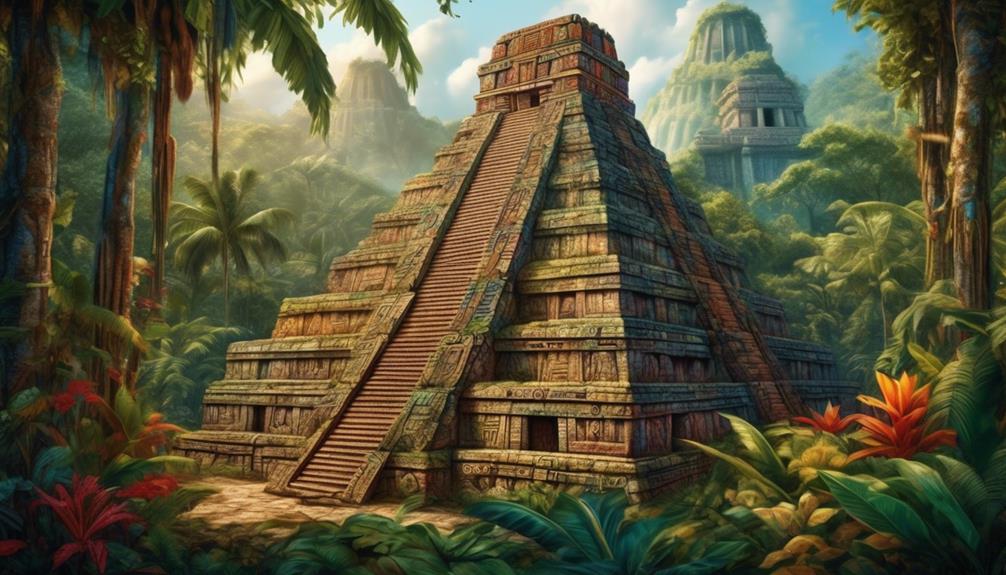
When we think of Central America, we often imagine lush rainforests and ancient civilizations. Who were the people who thrived in this region, leaving behind legacies that continue to intrigue us today?
The answer lies in the rich tapestry of indigenous cultures that called Central America home. From the enigmatic Olmec to the awe-inspiring Maya, and the majestic Aztec to the resilient Taino, the ancient inhabitants of Central America have left an indelible mark on history.
But what were their societies like? What were their achievements and beliefs? Join us as we uncover the fascinating stories of these remarkable civilizations and their enduring influence on the world.
Key Takeaways
- The Olmec civilization was the earliest civilization in Central America and thrived from approximately 1400 BCE to 400 BCE. They were known for their distinctive art style, monumental architecture, and religious practices.
- The Maya civilization flourished from 2000 BC to 1500 AD and had impressive mastery of astronomy and mathematics. They developed a complex calendar system, built impressive cities with pyramids and palaces, and practiced human sacrifice in religious rituals.
- The Zapotec civilization, which flourished from 600 BC to 800 AD, was distinguished as innovators in architecture and urban planning. They developed a system of writing using hieroglyphs, constructed efficient drainage systems, and engaged in agriculture.
- The Aztec civilization emerged as powerful empire builders in Mesoamerica in the 14th century AD. They established a capital city, Tenochtitlan, developed sophisticated agricultural techniques, constructed awe-inspiring pyramids and temples, and practiced human sacrifice as part of their religious beliefs.
Olmec: Central America's Earliest Civilization
The Olmec civilization, often considered the earliest civilization in Central America, has intrigued researchers and archaeologists for decades due to its enigmatic cultural and monumental achievements. The Olmec people, who thrived from approximately 1400 BCE to 400 BCE, exerted significant cultural influences on subsequent Mesoamerican civilizations. Their legacy is evident in various aspects, such as their distinctive art style, monumental architecture, and religious practices, which laid the foundation for the development of later societies in the region.
One of the most remarkable cultural influences of the Olmec civilization is their art, characterized by the creation of colossal stone heads and intricate jade figurines. These masterpieces not only reflect the Olmec's advanced sculpting techniques but also provide insights into their religious beliefs and societal structure.
Additionally, the Olmec's architectural achievements, such as the construction of ceremonial centers and earthen mounds, demonstrate their sophisticated understanding of urban planning and ceremonial spaces, influencing subsequent Mesoamerican societies.
Furthermore, the Olmec's religious practices, including the worship of deities associated with fertility and rain, had a lasting impact on the spiritual beliefs of later civilizations, illustrating the enduring cultural legacy of the Olmec civilization in Central America.
Maya: Masters of Astronomy and Mathematics
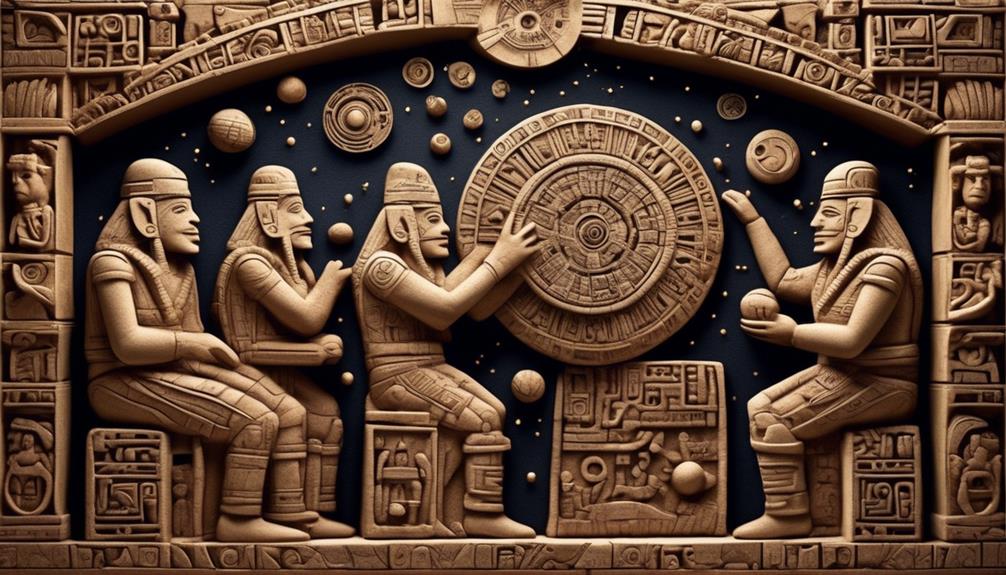
During our research, we discovered the impressive mastery of astronomy and mathematics exhibited by the ancient Maya civilization. The Maya people made significant contributions to Mesoamerican achievements through their Indigenous knowledge and skills in these fields. Their understanding of astronomy was evident in the precise alignment of their temples and observatories with celestial events, such as solstices and equinoxes. Additionally, the Maya developed a complex calendar system that incorporated both solar and ritual cycles, showcasing their advanced mathematical abilities. Below is a table highlighting some key aspects of the Maya's astronomical and mathematical achievements:
| Aspect | Description | Example |
|---|---|---|
| Astronomy | Precise alignment of structures with celestial events, development of a sophisticated calendar system | Temples and observatories aligned with solstices |
| Mathematics | Complex numerical system, including the concept of zero, advanced understanding of geometry and mathematical calculations | Use of a base-20 numerical system, accurate mathematical calculations |
The Maya's expertise in astronomy and mathematics not only facilitated their everyday lives but also played a crucial role in their religious and ceremonial practices. Their knowledge and skills continue to fascinate and inspire modern scholars and enthusiasts, shedding light on the intellectual achievements of ancient Indigenous civilizations.
Zapotec: Innovators in Architecture and Urban Planning
Building on the remarkable achievements of the Maya in astronomy and mathematics, the Zapotec civilization distinguished itself as innovators in architecture and urban planning in ancient Central America. Zapotec urban design was characterized by advanced architectural achievements, which showcased their profound understanding of engineering and urban layout.
One of the most notable examples of their architectural prowess is the ancient city of Monte Albán. This urban center, established around 500 BCE, featured impressive structures such as the Great Plaza, the Ball Court, and the Palace. The layout of Monte Albán was meticulously planned, with complex building designs and precise orientation to celestial events, reflecting the Zapotec's deep knowledge of astronomy and its integration into urban planning.
Furthermore, the Zapotec people constructed efficient drainage systems and terraces for agriculture, demonstrating their practical understanding of landscape utilization and environmental adaptation. Their architectural and urban planning innovations not only contributed to the functionality and sustainability of their cities but also reflected their cultural and social values.
The Zapotec's legacy in architecture and urban planning continues to fascinate and inspire modern-day urban designers and architects, emphasizing the enduring impact of their ancient wisdom and innovation.
Aztec: Legacy of Powerful Empire Builders
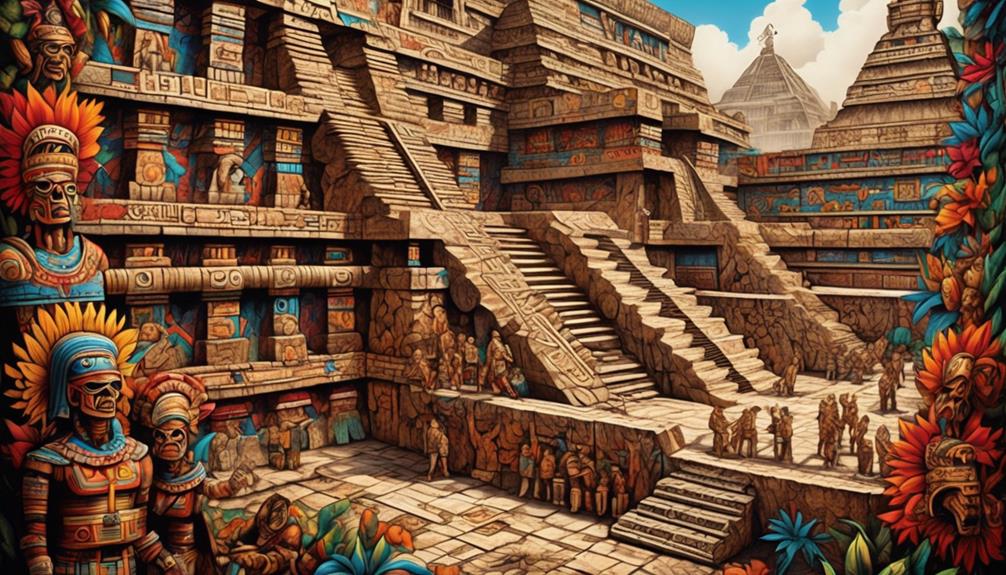
Emerging as formidable empire builders in the heart of Mesoamerica, the Aztec civilization left an indelible mark on the region's history and culture.
The Aztecs, also known as Mexica, created a powerful empire through a combination of military conquest, strategic alliances, and a well-organized system of governance.
Their legacy is characterized by a complex society, intricate religious beliefs, and monumental architectural achievements.
The Aztecs established a capital city, Tenochtitlan, on an island in Lake Texcoco, which became the center of their vast empire.
They developed sophisticated agricultural techniques, built intricate irrigation systems, and constructed awe-inspiring pyramids and temples.
Their influence extended to art, literature, and a complex calendar system that reflected their advanced understanding of astronomy.
Despite the Aztec Empire's eventual fall to Spanish conquest, their legacy continues to resonate in modern-day Mexico and beyond, shaping the cultural identity of the region.
The Aztecs' impact as empire builders is a testament to their enduring power and influence, leaving a lasting imprint on the history of Central America.
Taino: Indigenous Inhabitants of the Caribbean Islands
The legacy of powerful empire builders in Central America, such as the Aztec civilization, sets the stage for understanding the rich cultural heritage of the Taino, indigenous inhabitants of the Caribbean Islands. The Taino culture was deeply rooted in their traditional practices, including agriculture, fishing, and intricate craftwork. They were skilled in cultivating cassava, corn, and sweet potatoes, and their artistic expressions were evident in pottery, jewelry, and ceremonial objects.
Today, many Taino descendants continue to honor and preserve their cultural heritage. Efforts to revive traditional Taino practices, language, and spirituality are underway, contributing to the resurgence of Taino identity. Additionally, there are ongoing initiatives to protect and conserve Taino archaeological sites, artifacts, and historical records, ensuring that their legacy endures for future generations.
Understanding the Taino culture offers a glimpse into the rich tapestry of indigenous peoples who shaped the Americas. Their resilience, traditions, and contributions to art and agriculture continue to inspire admiration and respect. As we delve deeper into the Taino's history and contemporary preservation efforts, we gain a profound appreciation for their enduring legacy.
Frequently Asked Questions
What Were the Religious Beliefs and Practices of the Olmec Civilization?
We studied the religious practices of the Olmec civilization, and their beliefs were intricately intertwined with their art.
The Olmecs revered deities associated with fertility, rain, and agriculture, as evidenced by their monumental sculptures and ceremonial objects.
Rituals, including bloodletting and human sacrifice, were central to their religious ceremonies.
The Olmec art also depicted shamanic transformations, reflecting their spiritual connection to the natural world.
How Did the Maya Society Govern Itself and What Was the Political Structure Like?
We've delved into the fascinating structure of Maya governance and political organization, shedding light on their hierarchical society.
The Mayans governed themselves through a complex system of city-states, each ruled by a divine king. These rulers held significant power and authority, overseeing religious ceremonies and trade.
The political structure was marked by social stratification, with nobles and priests holding key positions.
This intricate system provides deep insights into Maya civilization's sophisticated organization.
What Were the Major Achievements in Art and Culture of the Zapotec Civilization?
Artistic achievements of the Zapotec civilization included intricate pottery, impressive stone carvings, and elaborate architecture, showcasing their advanced craftsmanship and artistic expression.
Their cultural influence extended to their unique writing system, religious practices, and complex calendar system, which impacted subsequent Mesoamerican cultures.
The Zapotecs' artistic and cultural contributions are a testament to their sophisticated society and enduring legacy in Central America.
What Were the Main Factors That Led to the Decline of the Aztec Empire?
We often overlook the interconnectedness of economic and social factors when examining the decline of the Aztec Empire.
Various historical accounts highlight the impact of internal strife and external pressures on the empire's stability.
Economic strain from continuous expansion and social unrest due to oppressive governance were pivotal in the empire's downfall.
Exploring these multifaceted influences provides a comprehensive understanding of the complex forces at play during this significant period in Central American history.
What Were the Traditional Customs and Daily Life of the Taino People on the Caribbean Islands?
In discussing Taino customs, daily life, agriculture, and social structure, it's vital to understand the rich cultural traditions and societal organization of this indigenous group.
Taino customs encompassed a deep connection to nature, reflected in their agricultural practices and spiritual beliefs.
Daily life revolved around communal activities and a well-defined social structure.
This evidence-based perspective provides a comprehensive understanding of the Taino people's way of life in the Caribbean islands.
Conclusion
In conclusion, the ancient indigenous people of Central America, including the Olmec, Maya, Zapotec, Aztec, and Taino, left behind a rich cultural legacy that continues to fascinate and inspire us today.
Through thorough research and evidence-based analysis, we can appreciate the depth and complexity of their achievements in astronomy, mathematics, architecture, urban planning, and empire building.
The truth of their contributions adds an important cultural context to our understanding of the history of Central America.
Mary is a passionate writer who brings creativity and a fresh perspective to our team. Her words have the power to captivate and inspire, making her an essential contributor to our content. Mary’s commitment to storytelling and dedication to promoting Indigenous culture ensures that her work touches the hearts of our readers. We’re fortunate to have her as part of our team.
-
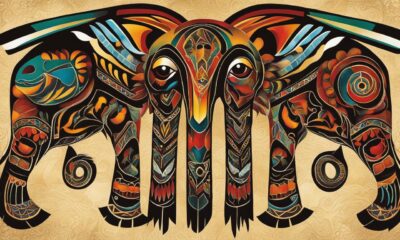
 Culture2 weeks ago
Culture2 weeks agoUnderstanding Aboriginal Totem Significance
-
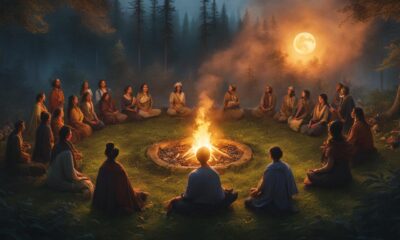
 Torres Strait Islanders16 mins ago
Torres Strait Islanders16 mins agoSacred Healing: Discovering Indigenous Health Secrets
-

 Torres Strait Islanders1 hour ago
Torres Strait Islanders1 hour agoJourney to Wellness: Indigenous Health Product Guide
-
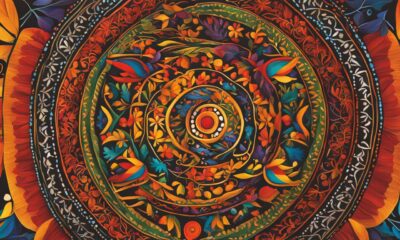
 Torres Strait Islanders1 hour ago
Torres Strait Islanders1 hour agoCultural Vitality: Indigenous Health Tips
-
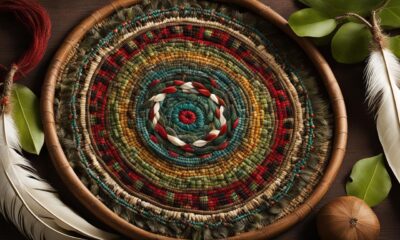
 Torres Strait Islanders41 mins ago
Torres Strait Islanders41 mins agoEmbrace Indigenous Wisdom: Top Well-Being Products
-
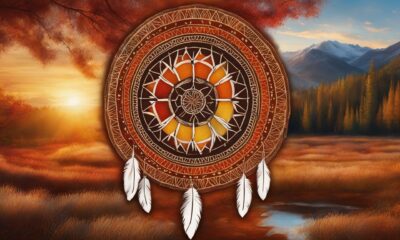
 Torres Strait Islanders21 mins ago
Torres Strait Islanders21 mins agoHolistic Health: Indigenous Wellness Explored
-
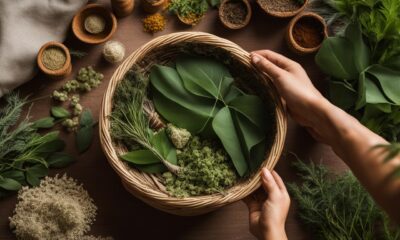
 Torres Strait Islanders1 hour ago
Torres Strait Islanders1 hour agoNature’s Wisdom: Indigenous Well-Being Remedies
-

 Torres Strait Islanders22 mins ago
Torres Strait Islanders22 mins agoIndigenous Health Products Guide for Wellness












